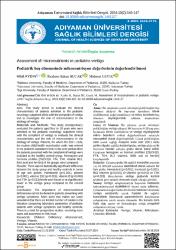Assessment of micronutrients in pediatric vertigo

View/
Access
info:eu-repo/semantics/openAccesshttp://creativecommons.org/licenses/by-nc-nd/3.0/us/Date
2024Metadata
Show full item recordAbstract
Aim: This study aimed to evaluate the clinical characteristics of patients admitted to the pediatric neurology outpatient clinic with the complaint of vertigo and to investigate the role of micronutrients in the etiology of vertigo Materials and Methods: This study retrospectively evaluated the patients aged four to 18 years who were admitted to the pediatric neurology outpatient clinic with the complaint of vertigo to evaluate the clinical characteristics and the role of micronutrients in the etiology of vertigo. Patients, for whom the Z00.1 code, the routine child health examination code, was entered in the pediatric outpatient clinic in the same period when the patients presented with the complaint of vertigo were included as the healthy control group. Hemogram and hormone profiles [25(OH)D, FT4, TSH, vitamin B12, folic acid and ferritin] of the groups were compared. Results: There was no statistically significant difference between the study group and healthy controls in terms of age and gender. Hematocrit (p<0.001), platelet (p<0.001), vitamin B12 (p=0.015), vitamin D (p=0.043) and TSH (p=0.013) levels were found to be significantly lower in the vertigo group compared to the control group. Conclusion: The importance of micronutritional deficiencies cannot be denied in patients presenting with vertigo symptoms. Main point that makes our study valuable is that there are limited number of studies in the literature comparing laboratory parameters of pediatric patients with vertigo symptoms and healthy controls. There is a need for prospective studies, involving more cases and awareness on this issue. Amaç: Bu çalışmada çocuk nörolojisi polikliniğine baş dönmesi şikâyeti ile başvuran hastaların klinik özelliklerinin değerlendirilmesi ve mikro besinlerin baş dönmesi etiyolojisindeki rolünün araştırılması amaçlandı. Gereç ve Yöntem: Bu çalışma, çocuk nörolojisi polikliniğine vertigo şikayeti ile başvuran 4-18 yaş arası hastaların klinik özelliklerini ve vertigo etiyolojisinde mikro besinlerin rolünü değerlendirmek amacıyla retrospektif olarak değerlendirildi. Çocuk polikliniğine rutin çocuk sağlığı muayene kodu olan Z00.1 kodu girilen olgular sağlıklı kontrol grubu, vertigo şikâyeti ile başvuran hastalar çalışma grubu olarak kabul edildi. Grupların hemogram ve hormon profilleri [25(OH)D, FT4, TSH, B12 vitamini, folik asit ve ferritin] karşılaştırıldı. Bulgular: Çalışma grubu ile sağlıklı kontroller arasında yaş ve cinsiyet açısından istatistiksel olarak anlamlı bir fark yoktu. Hematokrit (p<0,001), trombosit (p<0,001), B12 vitamini (p=0,015), D vitamini (p=0,043) ve TSH (p=0,013) düzeylerinin vertigo grubunda kontrol grubuna göre anlamlı derecede düşük olduğu görüldü. Sonuç: Vertigo semptomlarıyla başvuran hastalarda mikronütrisyonel eksikliklerin önemi inkâr edilemez. Çalışmamızı değerli kılan en önemli nokta ise literatürde vertigo semptomlu çocuk hastalar ile sağlıklı kontrollerin laboratuvar parametrelerini karşılaştıran çalışmaların sınırlı sayıda olmasıdır. Bu konuda daha fazla olgu içeren ve farkındalığın arttığı prospektif çalışmalara ihtiyaç vardır.
Source
Adıyaman Üniversitesi Sağlık Bilimleri DergisiVolume
10Issue
2Collections
The following license files are associated with this item:


















